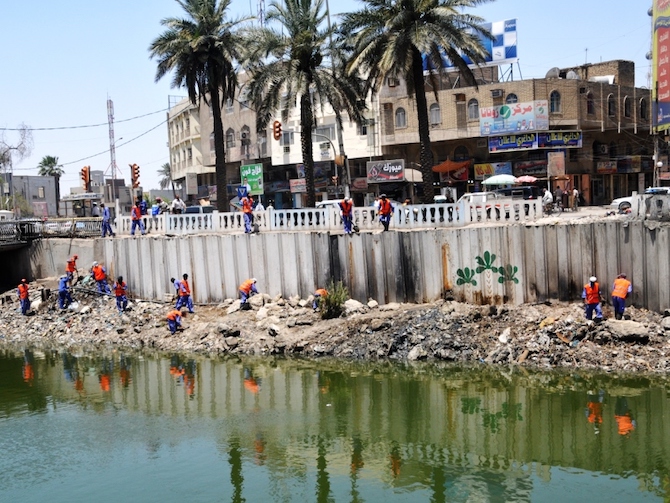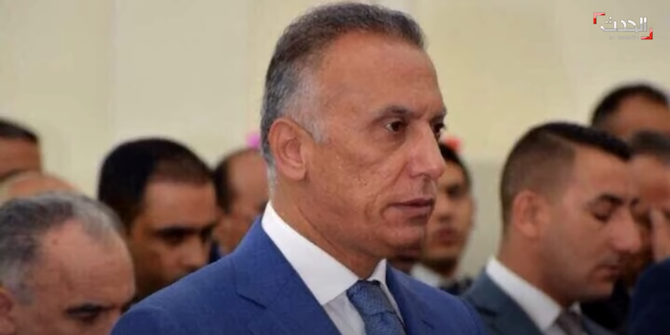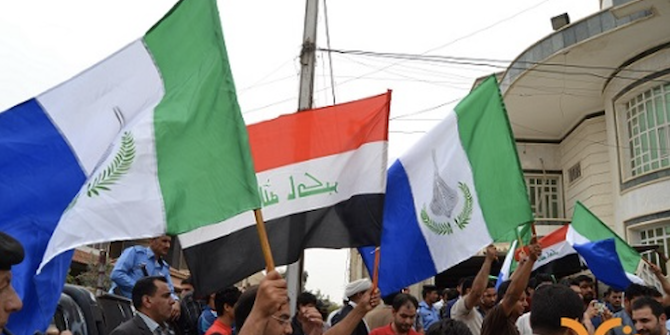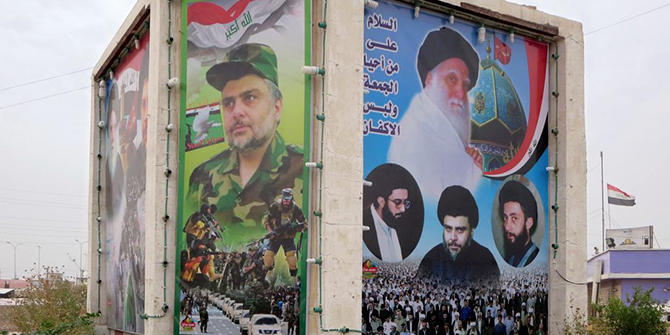by Omar Al-Jaffal and Safaa Khalaf

For four decades, Basra has been the arena of the central Iraqi government’s absurd wars. These wars, either those fought by Iraq against neighbouring countries, or those that were waged against it by external forces, affected the city’s infrastructure and its economic resources. Basra was the battleground of most of Baghdad’s devastating wars. The US-allied war waged against Iraq in 2003 and overthrew Saddam Hussein’s regime affected the city’s demographics, and led to the emergence of numerous leaders who became active in Basra and led also to a clear change in its economy and environment.
Today, the southernmost province of Iraq is one of the most visible failures of the successive post-invasion Iraqi governments. The city’s infrastructure is broken, with its society experiencing severe crises of unemployment, diseases, lack of services, high illiteracy and drug proliferation. Militarism controls the city, which has become a human reservoir of armed factions.
During the years 2003–9, Basra fought an armed military conflict between the armed factions and the British forces occupying the city. These factions then confronted the Iraqi security forces during ‘Operation Knight’s Charge’. Upon the emergence of the terrorist organisation known as Daesh, Basra became an important centre for the making and training of the armed factions, as most of the leaders of the Hashd al-Sha’abi, or ‘Popular Mobilisation Forces’ are originally from Basra.
In the midst of all these worsening crises, Basra is also in the heart of a fierce regional conflict, particularly between the United States and Iran, in addition to the Gulf regional enclaves that want to benefit from that conflict.
Conversely, Basra still contributes the most to Iraq’s budget. The governorate’s 15 oil fields are highly efficient and produce more than 80 percent of the country’s oil exports. In return, Basra receives only about 5 percent of the funds derived from its resources. As Basra is a major centre for oil extraction, the environment suffers from severe pollution, which causes many diseases among the population; compounded by the severe shortage Basra suffers from in health services.
Despite the fact that Basra is Iraq’s only gateway to the Gulf, with a number of ports from which several international companies operate, the population continue to experience high unemployment rates.
This reality has infuriated Basra’s over three million denizens. In the summer, thousands of them take to the streets to protest when electricity is cut off, as the heat reaches around 50 degrees Celsius. During this time many towns suffer from drinking water shortages or toxicity and high levels of salinity.
The summer of 2018 was a prime example of this anger at the governing political parties and their supporting countries. Demonstrators torched the headquarters of the parties and armed factions, as well as the Iranian Consulate. Some protesters closed the roads to ports and oilfields to hamstring the economy. The government responded violently against the protesters, arrested dozens and killed several. The aftermath increased the dominance of armed factions, to the point that the US consulate in Basra closed its doors and ordered its staff to leave.
The parliamentary elections in 2018 showed a sharp decline in the participation of Basra residents in the vote, which was considered a sign of desperation and loss of belief in political change through the elections.
All these events and transformations led to a change in behaviour on the part of the political actors, activists and protesters in Basra. Each side has had new ways of dealing with reality in order to achieve a change in the structure of the local government. The groups demanding to declare Basra a similar territory to the Kurdistan region in northern Iraq, or a region with far broader powers which paves the way for future separation, were on the alert.
Therefore, in our research, we try to understand the crises of Basra and the resulting developments. We seek to understand these transformations through interviews with the actors in Basra and conduct field research to monitor public opinion. Unlike all the studies that focus hierarchically on Basra by examining it from a central perspective, i.e. from the political capital in Baghdad, we seek to understand Basra locally, through the local administrations and institutions, the civil society and the activists and to understand the structure of the crises that plague the city, and to form by the end a realistic picture of what the city might become in the future.
The study comes at a sensitive and exceptional time, following a major uprising by the city’s residents. After a year of protests, much of the demands have not been met and services are more depleted. The political situation is even more uncertain and it is unclear how the angry population will deal with the upcoming elections as a peaceful method for change.
The study is one of the few conducted in the field in Basra. It does not express the central view but rather the local views of the population about their city and its future. It is based on direct interviews with local government, security and civil society officials as well as activists, political actors and protest organisers. In order to better understand the demands and views adopted by the street away from the officials and activists, the study is utilising a questionnaire, which will target a random sample – taking into account the gender balance – to see at first hand the foremost problems experienced by the residents of Basra.
In practice, field research for the study will take place during the hot summer in Basra, with the sharp rise of high temperatures and the rise of the protest movement at all levels. Therefore, this timing is ideal for monitoring public opinion and to identify the problems in order to ensure the formation of an objective research picture.
هذا المقال متوفر باللغة العربية هنا







1 Comments